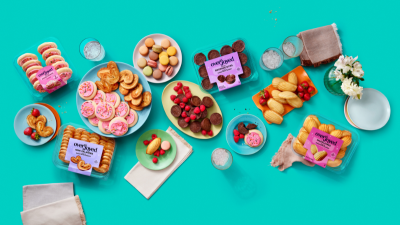US private-label groceries to hit 25-30% market share in next 10 years, RaboResearch projects

“While private label growth has historically lagged behind expectations, the tide may finally be turning. Several key factors are driving this growth: strategic retailer focus, the rise of hard discounters like Aldi, and increasing consumer demand fueled by improved perceptions of private label quality and value,” Tom Bailey, senior consumer foods analyst at RaboResearch, told FoodNavigator-USA.
Retailers expand private-label offerings, as economic pressures mount
US consumers are trading down to private-label brands (i.e., store brands) due to economic factors, government policy changes and lingering concerns about high food prices, Bailey explained in a RaboResearch report on private label.
The Supplemental Nutrition Assistance Program — better known as SNAP — benefits were slashed by 25% in 2023, applying pressure to the 12% of consumers who rely on the government program. Additionally, record-high credit card debt in the second quarter, indicating a cost-of-living crisis, Bailey noted.
Retailers and private-label food manufacturers are doubling down on investments in private-label brand development by developing on-trend foods and beverages.
“This dual growth in supply and demand is poised to boost private label market share significantly over the next decade, potentially reaching 25% and possibly even as high as 30%,” Tom Bailey, senior consumer foods analyst at RaboResearch, told FoodNavigator-USA.
Last month, Albertsons made its "first major new brand launch in over 10 years" with the release of its Overjoyed portfolio, a brand focused on special big and small occasions, Brandon Brown, senior VP of OWN brands at Albertsons, previously shared in a FoodNavigator-USA article.
Earlier in the year, CVS expanded and rebranded its line of private-label snacks and foods with a focus on function and fun flavors, including with products like Cinnamon Goji Protein-Boosted and Berry Vanilla Protein-Boosted Oatmeal.
“If these trends continue, we can expect both supply and demand for private label to grow. Retailers are expanding their private label offerings, as evidenced by Walmart’s recent introduction of the Bettergoods brand. At the same time, consumers are likely to be pleasantly surprised by the enhanced quality, availability and affordability of private-label products. This dual growth in supply and demand is poised to boost private label market share significantly over the next decade, potentially reaching 25% and possibly even as high as 30%,” Bailey said.
A ‘fragmented retail landscape’ slows down US private label growth
Despite recent growth from changing consumer behaviors, the US private-label market share penetration lags other countries, due to a combination of a "fragmented retailer landscape,” strong national brands and other factors, RaboResearch shared in the report.
The US private-label market accounts for 19% of total grocery spending in 2023, growing from 17% in 2013, according to PLMA and RaboResearch data. In comparison, the UK and Netherlands private-label markets account for about 45% of grocery spending.
The fragmented retail landscape in the US makes it harder for retailers to launch private-label offerings since they do not have the scale to compete with branded national companies, Bailey explained in the report. The top three US retailers account for 38% of private label, compared to 45% and 58% of market share for UK and Netherland markets, respectively, according to RaboResearch data.
Additionally, national brands play a stronger role in the US marketplace with retailers and CPG brands developing a pricing structure that benefits both the premium aspect of national brands as well as the value of private-label products. Typically, national brands maintain a 25% market premium over private-label foods and beverages, RaboResearch shared in the report.














